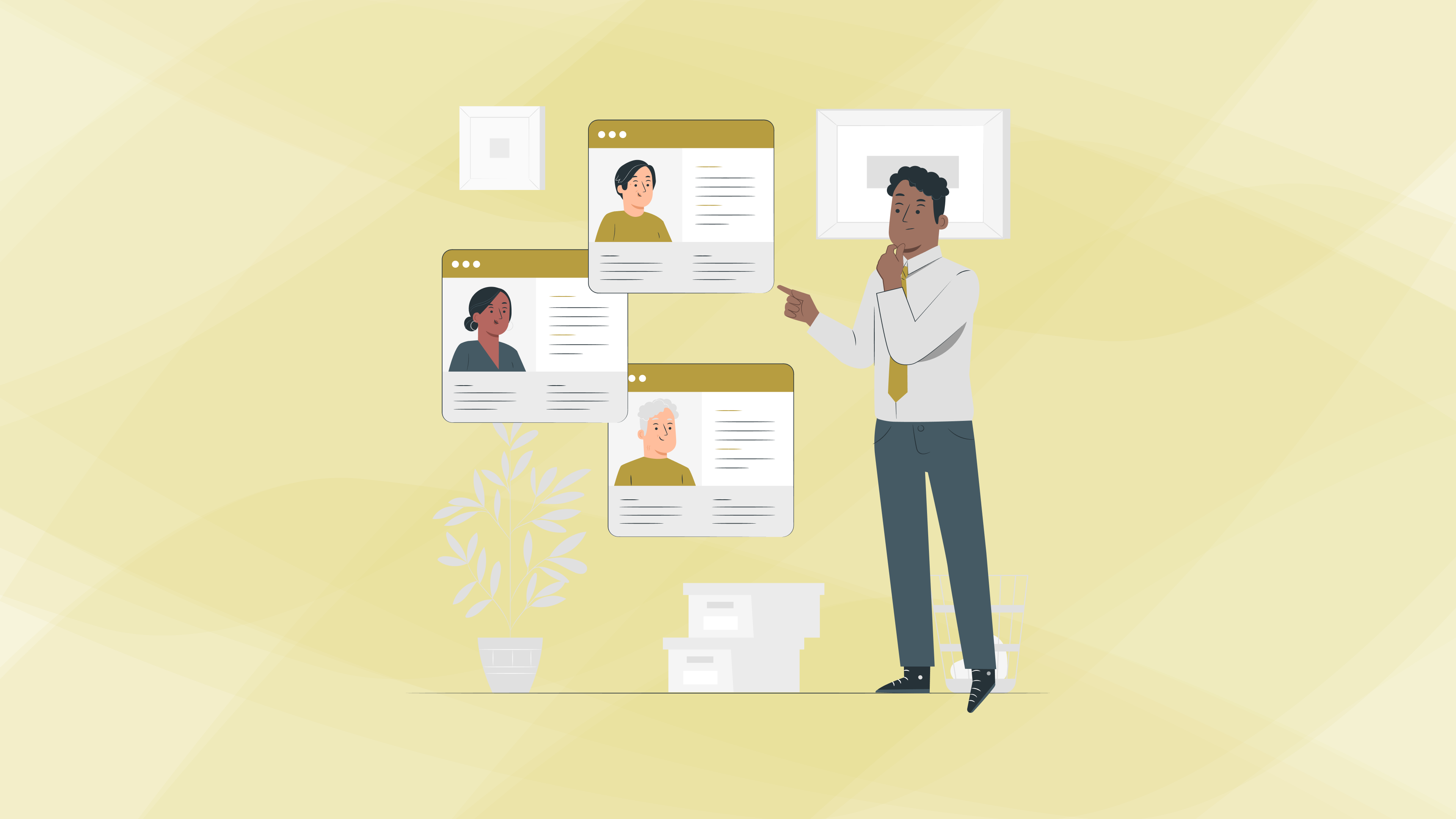Digital Credential
How Digital Credentials Reduce Fraud in the Hiring Process in India
How Digital Credentials Reduce Fraud in the Hiring Process in India
How Digital Credentials Reduce Fraud in the Hiring Process in India
Nov 12, 2024



In India’s fast-evolving job market, hiring fraud has become a growing concern. Issues like fake degrees, inflated experience, and falsified certifications can result in serious consequences for companies, from financial losses to reputational damage. Digital credentials are transforming the hiring landscape, offering a secure and reliable solution to verify a candidate’s qualifications, skills, and experience, effectively reducing fraud in the hiring process.
This blog explores how digital credentials are helping Indian employers combat hiring fraud, providing a faster, more accurate, and secure method for validating candidate information.
What Are Digital Credentials?
Digital credentials are secure, verifiable, and tamper-proof representations of an individual’s qualifications, skills, or experience stored digitally. These include educational degrees, certifications, professional licenses, and more. Digital credentials are issued by legitimate institutions or professional organizations and often use technologies like blockchain to ensure authenticity and integrity.
Instead of relying on traditional paper documents, digital credentials allow employers to instantly verify a candidate's qualifications, making them a powerful tool in the hiring process.
Why Fraud is a Problem in the Hiring Process
Hiring fraud remains a significant issue in India. Candidates may forge degrees, inflate their work experience, or misrepresent their skills to secure a position, which can lead to:
Financial losses for companies due to hiring unqualified employees.
Decreased productivity from employees who lack the required skills.
Reputational damage if clients or partners discover unqualified employees.
Increased turnover rates, as unqualified hires often fail to meet performance standards.
Traditional background verification methods are not always foolproof and can be time-consuming, costly, and vulnerable to human error. Digital credentials offer a way to combat these issues effectively.
How Digital Credentials Reduce Fraud in Hiring
Digital credentials provide a secure and transparent way to verify candidate information, addressing many of the challenges associated with hiring fraud. Here’s how they improve the security and reliability of the hiring process:
1. Tamper-Proof Verification Using Blockchain
Many digital credentials are stored on blockchain, a technology known for its security and immutability. Blockchain technology makes it nearly impossible to alter or forge credentials once they’re issued. Since each credential is encrypted and permanently stored on the blockchain, employers can be confident that the information they’re reviewing is authentic and has not been manipulated. This greatly reduces the risk of forged degrees, falsified certifications, or altered work history.
2. Instant Verification of Educational and Professional Credentials
Digital credentials allow instant verification from accredited institutions. For example, education records can be stored on platforms like DigiLocker or TruScholar in India, enabling universities to issue digital certificates directly. Employers can then verify these credentials instantly without needing to contact the educational institution, eliminating delays and increasing accuracy.
This streamlined verification is especially valuable for fast-paced hiring processes, where companies need quick access to authentic records without waiting weeks for verification.
3. Enhanced Accuracy and Reduced Human Error
In traditional background verification, errors can occur due to manual processing or misinterpretation of data. Digital credentials minimize human error by automating the verification process and eliminating manual paperwork. By standardizing the format and structure of credentials, digital platforms ensure that records are accurate and easily understandable, reducing the likelihood of hiring based on incorrect or incomplete information.
4. Secure Sharing with Candidate Consent
Digital credentials allow candidates to share their verified records securely and selectively, reducing the chance of unauthorized or altered information being shared. Candidates can grant access to their digital credentials directly through secure links or QR codes, ensuring that the employer receives unaltered, verified information. This process not only enhances security but also gives candidates control over their data.
5. Cost Savings and Efficiency in the Verification Process
Traditional background checks can be expensive, involving third-party agencies, administrative fees, and time spent on manual verification. Digital credentials eliminate the need for third-party verification, allowing companies to save significantly on hiring costs. Additionally, automated verification reduces the time spent by HR personnel on checking credentials, freeing them to focus on higher-value tasks and ensuring a more efficient hiring process.
6. Reducing Inflated Experience and Skills Claims
With digital credentials, companies can verify a candidate’s certifications, training, and skills more accurately. For example, platforms like Credly or SkillChain enable professional organizations to issue skills-based digital badges that confirm specific competencies. This is particularly helpful in verifying technical skills or specialized training. Employers can confirm the authenticity of these skills through digital badges, reducing the risk of hiring candidates who exaggerate their capabilities.
7. Enhanced Compliance with Industry Regulations
In industries like finance, healthcare, and IT, companies are required to maintain high standards of compliance and due diligence. Digital credentials offer a robust audit trail and verifiable proof of employee qualifications, helping companies meet regulatory standards without added administrative burden. In cases where regular audits are necessary, digital credentials make it easy for employers to present verified records of all employees.
Examples of Digital Credential Solutions in India
Several platforms and technologies are leading the way in providing digital credentials to support fraud-free hiring in India:
DigiLocker: A government-supported platform that enables educational institutions to issue verified digital certificates to students. Employers can access these certificates directly through DigiLocker with the candidate’s consent.
TruScholar: A blockchain-based platform that issues secure digital credentials, especially for educational and professional qualifications.
Credly: A digital credentialing platform popular for skills badges, allowing candidates to share verified skills and certifications with employers.
HireRight and AuthBridge: These companies offer comprehensive background verification services, including digital credential checks, criminal record verification, and employment history verification.
These platforms provide reliable and transparent systems for issuing, storing, and verifying credentials, making it easier for companies to conduct secure and fraud-resistant background checks.
Benefits of Digital Credentials for Employers
Digital credentials bring multiple benefits to employers, particularly when it comes to reducing fraud and improving hiring quality:
Improved Hiring Speed: By enabling instant verification, digital credentials reduce delays in the hiring process, allowing companies to onboard new employees faster.
Increased Hiring Accuracy: With secure and tamper-proof records, employers can rely on accurate information, improving the quality of their hires.
Reduced Financial Risk: Digital credentials help prevent fraudulent hires that may lead to financial losses, legal issues, or damage to the company’s reputation.
Compliance and Data Privacy: Digital credentials align with privacy laws and regulations, ensuring that companies verify candidates ethically and securely.
Enhanced Employer Reputation: A reliable verification process fosters a professional, trust-based reputation for employers, attracting high-quality talent and fostering a transparent workplace culture.
How Students and Candidates Benefit from Digital Credentials
Digital credentials aren’t just beneficial for employers; they also empower students and job seekers by:
Allowing Easy Sharing of Verified Skills and Achievements: Candidates can share their credentials with multiple employers without needing to obtain additional verifications.
Building Trust with Employers: Verified credentials make a candidate’s profile more trustworthy, increasing their chances of getting hired.
Promoting Skills Development: Platforms that issue skill badges encourage students and professionals to upskill, leading to a more qualified workforce.
Simplifying Documentation: Candidates don’t have to carry physical copies of certificates or degrees, reducing the risk of document loss or damage.
Future of Digital Credentials in India’s Hiring Landscape
As India’s job market continues to expand, digital credentials are set to become a standard part of employee verification. With rapid advancements in blockchain and credentialing technologies, digital credentials will likely cover a broader range of qualifications, from academic achievements to professional licenses and skill-based badges. Employers are expected to increasingly adopt these technologies to streamline verification processes, reduce hiring risks, and improve overall recruitment quality.
In the coming years, digital credentials will also likely integrate with artificial intelligence for even faster, more accurate hiring decisions, making the Indian hiring process safer, faster, and more efficient.
Conclusion
Digital credentials are revolutionizing the hiring process in India by reducing fraud, increasing transparency, and providing reliable verification for educational and professional qualifications. By leveraging secure platforms, blockchain technology, and instant verification processes, companies can now hire candidates with confidence, knowing that their credentials are legitimate and accurately represented.
For candidates, digital credentials create a smoother application experience, allowing them to showcase their qualifications without the delays and frustrations associated with traditional verification methods. As more organizations adopt digital credentialing, the hiring landscape in India will continue to become more secure, efficient, and fraud-resistant, benefiting both employers and job seekers.
In India’s fast-evolving job market, hiring fraud has become a growing concern. Issues like fake degrees, inflated experience, and falsified certifications can result in serious consequences for companies, from financial losses to reputational damage. Digital credentials are transforming the hiring landscape, offering a secure and reliable solution to verify a candidate’s qualifications, skills, and experience, effectively reducing fraud in the hiring process.
This blog explores how digital credentials are helping Indian employers combat hiring fraud, providing a faster, more accurate, and secure method for validating candidate information.
What Are Digital Credentials?
Digital credentials are secure, verifiable, and tamper-proof representations of an individual’s qualifications, skills, or experience stored digitally. These include educational degrees, certifications, professional licenses, and more. Digital credentials are issued by legitimate institutions or professional organizations and often use technologies like blockchain to ensure authenticity and integrity.
Instead of relying on traditional paper documents, digital credentials allow employers to instantly verify a candidate's qualifications, making them a powerful tool in the hiring process.
Why Fraud is a Problem in the Hiring Process
Hiring fraud remains a significant issue in India. Candidates may forge degrees, inflate their work experience, or misrepresent their skills to secure a position, which can lead to:
Financial losses for companies due to hiring unqualified employees.
Decreased productivity from employees who lack the required skills.
Reputational damage if clients or partners discover unqualified employees.
Increased turnover rates, as unqualified hires often fail to meet performance standards.
Traditional background verification methods are not always foolproof and can be time-consuming, costly, and vulnerable to human error. Digital credentials offer a way to combat these issues effectively.
How Digital Credentials Reduce Fraud in Hiring
Digital credentials provide a secure and transparent way to verify candidate information, addressing many of the challenges associated with hiring fraud. Here’s how they improve the security and reliability of the hiring process:
1. Tamper-Proof Verification Using Blockchain
Many digital credentials are stored on blockchain, a technology known for its security and immutability. Blockchain technology makes it nearly impossible to alter or forge credentials once they’re issued. Since each credential is encrypted and permanently stored on the blockchain, employers can be confident that the information they’re reviewing is authentic and has not been manipulated. This greatly reduces the risk of forged degrees, falsified certifications, or altered work history.
2. Instant Verification of Educational and Professional Credentials
Digital credentials allow instant verification from accredited institutions. For example, education records can be stored on platforms like DigiLocker or TruScholar in India, enabling universities to issue digital certificates directly. Employers can then verify these credentials instantly without needing to contact the educational institution, eliminating delays and increasing accuracy.
This streamlined verification is especially valuable for fast-paced hiring processes, where companies need quick access to authentic records without waiting weeks for verification.
3. Enhanced Accuracy and Reduced Human Error
In traditional background verification, errors can occur due to manual processing or misinterpretation of data. Digital credentials minimize human error by automating the verification process and eliminating manual paperwork. By standardizing the format and structure of credentials, digital platforms ensure that records are accurate and easily understandable, reducing the likelihood of hiring based on incorrect or incomplete information.
4. Secure Sharing with Candidate Consent
Digital credentials allow candidates to share their verified records securely and selectively, reducing the chance of unauthorized or altered information being shared. Candidates can grant access to their digital credentials directly through secure links or QR codes, ensuring that the employer receives unaltered, verified information. This process not only enhances security but also gives candidates control over their data.
5. Cost Savings and Efficiency in the Verification Process
Traditional background checks can be expensive, involving third-party agencies, administrative fees, and time spent on manual verification. Digital credentials eliminate the need for third-party verification, allowing companies to save significantly on hiring costs. Additionally, automated verification reduces the time spent by HR personnel on checking credentials, freeing them to focus on higher-value tasks and ensuring a more efficient hiring process.
6. Reducing Inflated Experience and Skills Claims
With digital credentials, companies can verify a candidate’s certifications, training, and skills more accurately. For example, platforms like Credly or SkillChain enable professional organizations to issue skills-based digital badges that confirm specific competencies. This is particularly helpful in verifying technical skills or specialized training. Employers can confirm the authenticity of these skills through digital badges, reducing the risk of hiring candidates who exaggerate their capabilities.
7. Enhanced Compliance with Industry Regulations
In industries like finance, healthcare, and IT, companies are required to maintain high standards of compliance and due diligence. Digital credentials offer a robust audit trail and verifiable proof of employee qualifications, helping companies meet regulatory standards without added administrative burden. In cases where regular audits are necessary, digital credentials make it easy for employers to present verified records of all employees.
Examples of Digital Credential Solutions in India
Several platforms and technologies are leading the way in providing digital credentials to support fraud-free hiring in India:
DigiLocker: A government-supported platform that enables educational institutions to issue verified digital certificates to students. Employers can access these certificates directly through DigiLocker with the candidate’s consent.
TruScholar: A blockchain-based platform that issues secure digital credentials, especially for educational and professional qualifications.
Credly: A digital credentialing platform popular for skills badges, allowing candidates to share verified skills and certifications with employers.
HireRight and AuthBridge: These companies offer comprehensive background verification services, including digital credential checks, criminal record verification, and employment history verification.
These platforms provide reliable and transparent systems for issuing, storing, and verifying credentials, making it easier for companies to conduct secure and fraud-resistant background checks.
Benefits of Digital Credentials for Employers
Digital credentials bring multiple benefits to employers, particularly when it comes to reducing fraud and improving hiring quality:
Improved Hiring Speed: By enabling instant verification, digital credentials reduce delays in the hiring process, allowing companies to onboard new employees faster.
Increased Hiring Accuracy: With secure and tamper-proof records, employers can rely on accurate information, improving the quality of their hires.
Reduced Financial Risk: Digital credentials help prevent fraudulent hires that may lead to financial losses, legal issues, or damage to the company’s reputation.
Compliance and Data Privacy: Digital credentials align with privacy laws and regulations, ensuring that companies verify candidates ethically and securely.
Enhanced Employer Reputation: A reliable verification process fosters a professional, trust-based reputation for employers, attracting high-quality talent and fostering a transparent workplace culture.
How Students and Candidates Benefit from Digital Credentials
Digital credentials aren’t just beneficial for employers; they also empower students and job seekers by:
Allowing Easy Sharing of Verified Skills and Achievements: Candidates can share their credentials with multiple employers without needing to obtain additional verifications.
Building Trust with Employers: Verified credentials make a candidate’s profile more trustworthy, increasing their chances of getting hired.
Promoting Skills Development: Platforms that issue skill badges encourage students and professionals to upskill, leading to a more qualified workforce.
Simplifying Documentation: Candidates don’t have to carry physical copies of certificates or degrees, reducing the risk of document loss or damage.
Future of Digital Credentials in India’s Hiring Landscape
As India’s job market continues to expand, digital credentials are set to become a standard part of employee verification. With rapid advancements in blockchain and credentialing technologies, digital credentials will likely cover a broader range of qualifications, from academic achievements to professional licenses and skill-based badges. Employers are expected to increasingly adopt these technologies to streamline verification processes, reduce hiring risks, and improve overall recruitment quality.
In the coming years, digital credentials will also likely integrate with artificial intelligence for even faster, more accurate hiring decisions, making the Indian hiring process safer, faster, and more efficient.
Conclusion
Digital credentials are revolutionizing the hiring process in India by reducing fraud, increasing transparency, and providing reliable verification for educational and professional qualifications. By leveraging secure platforms, blockchain technology, and instant verification processes, companies can now hire candidates with confidence, knowing that their credentials are legitimate and accurately represented.
For candidates, digital credentials create a smoother application experience, allowing them to showcase their qualifications without the delays and frustrations associated with traditional verification methods. As more organizations adopt digital credentialing, the hiring landscape in India will continue to become more secure, efficient, and fraud-resistant, benefiting both employers and job seekers.
In India’s fast-evolving job market, hiring fraud has become a growing concern. Issues like fake degrees, inflated experience, and falsified certifications can result in serious consequences for companies, from financial losses to reputational damage. Digital credentials are transforming the hiring landscape, offering a secure and reliable solution to verify a candidate’s qualifications, skills, and experience, effectively reducing fraud in the hiring process.
This blog explores how digital credentials are helping Indian employers combat hiring fraud, providing a faster, more accurate, and secure method for validating candidate information.
What Are Digital Credentials?
Digital credentials are secure, verifiable, and tamper-proof representations of an individual’s qualifications, skills, or experience stored digitally. These include educational degrees, certifications, professional licenses, and more. Digital credentials are issued by legitimate institutions or professional organizations and often use technologies like blockchain to ensure authenticity and integrity.
Instead of relying on traditional paper documents, digital credentials allow employers to instantly verify a candidate's qualifications, making them a powerful tool in the hiring process.
Why Fraud is a Problem in the Hiring Process
Hiring fraud remains a significant issue in India. Candidates may forge degrees, inflate their work experience, or misrepresent their skills to secure a position, which can lead to:
Financial losses for companies due to hiring unqualified employees.
Decreased productivity from employees who lack the required skills.
Reputational damage if clients or partners discover unqualified employees.
Increased turnover rates, as unqualified hires often fail to meet performance standards.
Traditional background verification methods are not always foolproof and can be time-consuming, costly, and vulnerable to human error. Digital credentials offer a way to combat these issues effectively.
How Digital Credentials Reduce Fraud in Hiring
Digital credentials provide a secure and transparent way to verify candidate information, addressing many of the challenges associated with hiring fraud. Here’s how they improve the security and reliability of the hiring process:
1. Tamper-Proof Verification Using Blockchain
Many digital credentials are stored on blockchain, a technology known for its security and immutability. Blockchain technology makes it nearly impossible to alter or forge credentials once they’re issued. Since each credential is encrypted and permanently stored on the blockchain, employers can be confident that the information they’re reviewing is authentic and has not been manipulated. This greatly reduces the risk of forged degrees, falsified certifications, or altered work history.
2. Instant Verification of Educational and Professional Credentials
Digital credentials allow instant verification from accredited institutions. For example, education records can be stored on platforms like DigiLocker or TruScholar in India, enabling universities to issue digital certificates directly. Employers can then verify these credentials instantly without needing to contact the educational institution, eliminating delays and increasing accuracy.
This streamlined verification is especially valuable for fast-paced hiring processes, where companies need quick access to authentic records without waiting weeks for verification.
3. Enhanced Accuracy and Reduced Human Error
In traditional background verification, errors can occur due to manual processing or misinterpretation of data. Digital credentials minimize human error by automating the verification process and eliminating manual paperwork. By standardizing the format and structure of credentials, digital platforms ensure that records are accurate and easily understandable, reducing the likelihood of hiring based on incorrect or incomplete information.
4. Secure Sharing with Candidate Consent
Digital credentials allow candidates to share their verified records securely and selectively, reducing the chance of unauthorized or altered information being shared. Candidates can grant access to their digital credentials directly through secure links or QR codes, ensuring that the employer receives unaltered, verified information. This process not only enhances security but also gives candidates control over their data.
5. Cost Savings and Efficiency in the Verification Process
Traditional background checks can be expensive, involving third-party agencies, administrative fees, and time spent on manual verification. Digital credentials eliminate the need for third-party verification, allowing companies to save significantly on hiring costs. Additionally, automated verification reduces the time spent by HR personnel on checking credentials, freeing them to focus on higher-value tasks and ensuring a more efficient hiring process.
6. Reducing Inflated Experience and Skills Claims
With digital credentials, companies can verify a candidate’s certifications, training, and skills more accurately. For example, platforms like Credly or SkillChain enable professional organizations to issue skills-based digital badges that confirm specific competencies. This is particularly helpful in verifying technical skills or specialized training. Employers can confirm the authenticity of these skills through digital badges, reducing the risk of hiring candidates who exaggerate their capabilities.
7. Enhanced Compliance with Industry Regulations
In industries like finance, healthcare, and IT, companies are required to maintain high standards of compliance and due diligence. Digital credentials offer a robust audit trail and verifiable proof of employee qualifications, helping companies meet regulatory standards without added administrative burden. In cases where regular audits are necessary, digital credentials make it easy for employers to present verified records of all employees.
Examples of Digital Credential Solutions in India
Several platforms and technologies are leading the way in providing digital credentials to support fraud-free hiring in India:
DigiLocker: A government-supported platform that enables educational institutions to issue verified digital certificates to students. Employers can access these certificates directly through DigiLocker with the candidate’s consent.
TruScholar: A blockchain-based platform that issues secure digital credentials, especially for educational and professional qualifications.
Credly: A digital credentialing platform popular for skills badges, allowing candidates to share verified skills and certifications with employers.
HireRight and AuthBridge: These companies offer comprehensive background verification services, including digital credential checks, criminal record verification, and employment history verification.
These platforms provide reliable and transparent systems for issuing, storing, and verifying credentials, making it easier for companies to conduct secure and fraud-resistant background checks.
Benefits of Digital Credentials for Employers
Digital credentials bring multiple benefits to employers, particularly when it comes to reducing fraud and improving hiring quality:
Improved Hiring Speed: By enabling instant verification, digital credentials reduce delays in the hiring process, allowing companies to onboard new employees faster.
Increased Hiring Accuracy: With secure and tamper-proof records, employers can rely on accurate information, improving the quality of their hires.
Reduced Financial Risk: Digital credentials help prevent fraudulent hires that may lead to financial losses, legal issues, or damage to the company’s reputation.
Compliance and Data Privacy: Digital credentials align with privacy laws and regulations, ensuring that companies verify candidates ethically and securely.
Enhanced Employer Reputation: A reliable verification process fosters a professional, trust-based reputation for employers, attracting high-quality talent and fostering a transparent workplace culture.
How Students and Candidates Benefit from Digital Credentials
Digital credentials aren’t just beneficial for employers; they also empower students and job seekers by:
Allowing Easy Sharing of Verified Skills and Achievements: Candidates can share their credentials with multiple employers without needing to obtain additional verifications.
Building Trust with Employers: Verified credentials make a candidate’s profile more trustworthy, increasing their chances of getting hired.
Promoting Skills Development: Platforms that issue skill badges encourage students and professionals to upskill, leading to a more qualified workforce.
Simplifying Documentation: Candidates don’t have to carry physical copies of certificates or degrees, reducing the risk of document loss or damage.
Future of Digital Credentials in India’s Hiring Landscape
As India’s job market continues to expand, digital credentials are set to become a standard part of employee verification. With rapid advancements in blockchain and credentialing technologies, digital credentials will likely cover a broader range of qualifications, from academic achievements to professional licenses and skill-based badges. Employers are expected to increasingly adopt these technologies to streamline verification processes, reduce hiring risks, and improve overall recruitment quality.
In the coming years, digital credentials will also likely integrate with artificial intelligence for even faster, more accurate hiring decisions, making the Indian hiring process safer, faster, and more efficient.
Conclusion
Digital credentials are revolutionizing the hiring process in India by reducing fraud, increasing transparency, and providing reliable verification for educational and professional qualifications. By leveraging secure platforms, blockchain technology, and instant verification processes, companies can now hire candidates with confidence, knowing that their credentials are legitimate and accurately represented.
For candidates, digital credentials create a smoother application experience, allowing them to showcase their qualifications without the delays and frustrations associated with traditional verification methods. As more organizations adopt digital credentialing, the hiring landscape in India will continue to become more secure, efficient, and fraud-resistant, benefiting both employers and job seekers.
Schedule your Free Demo
Empower Your Organization’s Growth with the Future of Digital Credentials.
Book a Demo
You Might Also Like
You Might Also Like
You Might Also Like

HR Insight
How to streamlines daily HR tasks with efficient solutions
Jan 22, 2025

Skill-Based Hiring
Why Skill-Based Hiring Is the Key to Building a Future-Ready Workforce
Jan 21, 2025

Blockchain
The Role of Blockchain in Transforming Skill-Based Hiring Processes
Jan 21, 2025

HR Insight
How to streamlines daily HR tasks with efficient solutions
Jan 22, 2025

Skill-Based Hiring
Why Skill-Based Hiring Is the Key to Building a Future-Ready Workforce
Jan 21, 2025

Blockchain
The Role of Blockchain in Transforming Skill-Based Hiring Processes
Jan 21, 2025

Truskillforce
10 strategies to enhance your professional growth
Jan 21, 2025

HR Insight
How to streamlines daily HR tasks with efficient solutions
Jan 22, 2025

Skill-Based Hiring
Why Skill-Based Hiring Is the Key to Building a Future-Ready Workforce
Jan 21, 2025

Blockchain
The Role of Blockchain in Transforming Skill-Based Hiring Processes
Jan 21, 2025

Truskillforce
10 strategies to enhance your professional growth
Jan 21, 2025